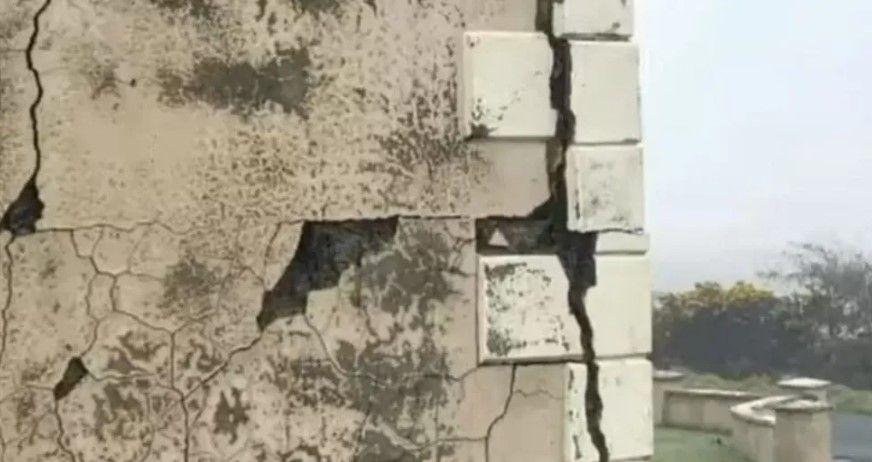Crumbling house grant scheme must improve - report

A crumbling home in the Republic of Ireland
At a glance
An Irish government scheme to give financial support to homes affected by defective concrete blocks needs to be improved, a draft report says
Thousands of homes have been crumbling in the Republic of Ireland
because of blocks containing high levels of the mineral mica
In November 2021 the government introduced what it said was a significant number of improvements to the previous scheme
- Published
A help scheme for people living in crumbling houses needs to be improved, a draft report has stated.
A delegation from the European Parliament's Petitions Committee travelled to the Republic of Ireland on a fact-finding visit over the use of defective concrete blocks in many houses.
Thousands of homes have been crumbling because of blocks containing high levels of the mineral mica, which absorbs water causing walls to crack and crumble.
The draft report from the European delegation's visit has made six recommendations to the government’s mica redress scheme.
These include the need to speed up progress in implementing the scheme and to reduce red tape around it.
It also said that a defective block crisis should not be allowed to occur ever again in the Republic of Ireland or any other EU member state.
'Serious flaws'
In 2016 an expert panel was set up in the Republic of Ireland to investigate problems with homes affected by mica and another mineral, pyrite.
In 2019 the Irish government approved a €20m (£17.2m) repair scheme.
But many homeowners said the scheme was not fit for purpose and called for full redress.
Under the old scheme, eligible homeowners would need to pay 10% of repairs, plus any outstanding mortgage payments on the home, with the government covering 90% of the cost.
In September, a 10% levy on concrete blocks was announced as part of the Irish government's budget.
In November 2021, the government introduced what it said was a significant number of improvements to the previous scheme.
The enhanced scheme, which is capped at €420,000 (£357,500) a household, would be made available for affected homeowners in Counties Donegal, Mayo, Clare and Limerick.
The Mica Action Group, which represents affected home owners, stated that the the enhanced scheme still did not go far enough and "serious flaws" remained.
'Urgently tackled'
According to the Europe Parliament's draft report, the delegation found that while the state's enhanced grant scheme was "very ambitious and comprehensive", it should be widened and red tape reduced.
It also said there was a need for a for a "clearer picture when it comes to identifying and holding accountable the persons and entities responsible for this situation".
It also found that the defective blocks had led to "severe health, financial and social consequences" which need to be "urgently tackled".
The findings of the report will now be discussed by the Petitions Committee when it meets in full in Brussels next Tuesday.